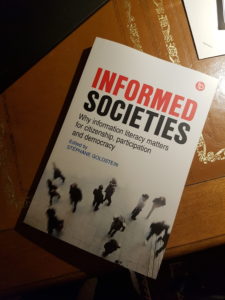Informed Societies
Why information literacy matters for citizenship, participation and democracy
By Stéphane Goldstein
 It’s been two years in the making, but at long last, I’m pleased to announce the publication of the book that I’ve edited, ‘Informed Societies: why information literacy matters for citizenship, participation and democracy’. The title, published by Facet, is available here.
It’s been two years in the making, but at long last, I’m pleased to announce the publication of the book that I’ve edited, ‘Informed Societies: why information literacy matters for citizenship, participation and democracy’. The title, published by Facet, is available here.
This book explains how and why information literacy can help to foster critical thinking and discerning attitudes, enabling citizens to play an informed role in society and its democratic processes. In early 21st century societies, individuals and organisations are deluged with information. Much of this is useful, valuable or enriching. But a lot of it is of dubious quality and provenance, if not downright dangerous. Misinformation forms part of the mix.
The ability to get the most out of the information flow, finding, interpreting and using it, and particularly developing a critical mindset towards it, requires skills, know-how, judgement and confidence – such is the premise of information literacy. This is true for many aspects of human endeavour, including education, work, health and self-enrichment. It is notably true also for acquiring an understanding of the wider world, for reaching informed views, for recognising bias and misinformation, and thereby for playing a part as active citizens, in democratic life and society.
The book comprises a dozen chapters from acknowledged international experts from a range of disciplines including not only information literacy, but also the diverse perspectives of political science, pedagogy, information science and psychology. A pre-print version of my introductory chapter (available under the publisher’s licensing terms) sets the scene, explains the context and is attached below:
PREPRINT – introduction – Goldstein
Informed Societies covers:
- why information literacy and informed citizens matter for healthy, democratic societies
- information literacy’s relationship with political science
- information literacy’s relationship with human rights
- how information literacy can help foster citizenship, participation, empowerment and civic engagement in different contexts: school students, refugees, older people and in wider society
- information literacy as a means to counter misinformation and fake news
- the challenges of addressing information literacy as part of national public policy.
Happy reading!
![InformAll [logo]](https://www.informall.org.uk/wp-content/themes/informall/assets/img/informall-logo.svg)